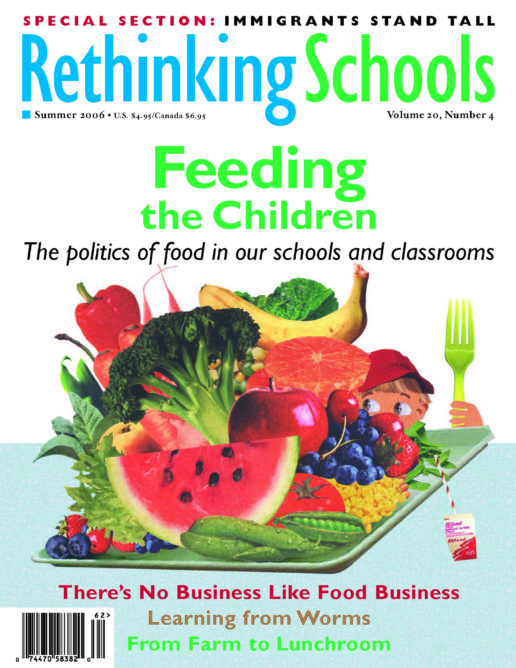Food Resources
Some Helpful Organizations on Food and the Environment
The Center
for Ecoliteracy (CEL)
2528 San Pablo Ave.
Berkeley, CA 94702
510-845-4595
www.ecoliteracy.org
The Center for Ecoliteracy is a public foundation dedicated to education for sustainable living. It administers a grant program, publishes in print and online, offers seminars and technical assistance, and supports systemic change, hands-on educational experience, and curricular innovation in such areas as food, health, habitat restoration, and environmental justice. CEL’s project Rethinking School Lunch includes a 275-page online guide, training and technical assistance programs, and the “Thinking Outside the Lunchbox” essay series.
Rethinking School Lunch approaches school lunch as part of an integrated curriculum that restores connections of meals to culture, learning to meaningful engagement, farms to communities, and health to our children and the environment.
As companion pieces to the Rethinking School Lunch online guide, CEL has produced a Model Wellness Policy Guide for schools, in collaboration with Slow Food USA and the Chez Panisse Foundation; and the RSL Visual Guide to Linking Food, Culture, Health and the Environment, which illustrates the RSL integration of formal classroom studies with lessons in informal learning environments such as instructional gardens, kitchen classrooms, and cafeterias.
In 2005, Sierra Club Books published Ecological Literacy: Educating our Children for a Sustainable World. Edited by CEL senior editor Michael K. Stone and executive director Zenobia Barlow, the book presents the center’s conceptual foundations and chronicles many of the projects that have put those concepts into practice.
The Community
Food Security Coalition
P.O. Box 209
Venice, CA 90294
310-822-5410
www.foodsecurity.org
The Community Food Security Coalition (CFSC) is a nonprofit organization dedicated to building strong, sustainable, local and regional food systems that ensure access to affordable, nutritious, and culturally appropriate food for all people at all times. It seeks to develop self-reliance among all communities in obtaining their food and to create a system of growing, manufacturing, processing, and selling food that is regionally based and grounded in the principles of justice, democracy, and sustainability. CFSC has over 325 member organizations.
Equal Exchange
50 United Drive
West Bridgewater, MA 02379
774-776-7400 www.equalexchange.com
The organization Equal Exchange has a new socially and ecologically responsible choice for school fundraisers. Equal Exchange, a worker-cooperative founded in 1986, is dedicated to fair trade and direct, long-term relationships with organized small-scale producers. For years Equal Exchange has had coffee, chocolate, and tea available at natural food stores. A new fundraiser program promotes sustainable choices for schools. Equal Exchange offers chocolates, coffee, and teas that are all fairly traded, organic, and from organized small-scale farmer organizations. Using Equal Exchange products can help raise money for school clubs and activities, but it can also raise awareness of food and justice issues. The process of fundraising can be a window into how the international food system works and how it benefits some over others, as well as how our buying choices can impact people around the world. Visit http://www.equalexchange.com/fundraiser/ for more information.
Family Farm Defenders
1019 Williamson St. #B
Madison, WI 53703
608-260-0900
www.familyfarmdefenders.org
Family Farmer Defenders is a national nonprofit grassroots organization based in Madison, Wis., that promotes sustainable agriculture, rural justice, workers rights, animal welfare, consumer safety, fair trade, and food sovereignty. Family Farm Defenders is dedicated to empowering farmers and consumers toward reclaiming their local food/farm systems. Family Farm Defenders has several thousand members nationwide and state chapters in Wisconsin, New York, Pennsylvania, Ohio, and Michigan. Family Farm Defenders is part of the National Family Farm Coalition (NFFC) and is also active in Via Campesina, the largest umbrella organization for farmer/peasant/indigenous organizations around the world.
Food First/Institute for Food and Development Policy
398 60th St., Oakland, CA 94618
510-654-4400
www.foodfirst.org
Food First describes itself as “a peoples’ think tank and education-for-action center.” Over the 25 plus years that this pioneering organization has been around, it has published some of the most useful books on food and hunger issues.
Through its publications and activism it continues to offer leadership in the struggle for reforming the global food system from the bottom up. The Food First catalog is available on their website.
Institute for Agriculture
and Trade Policy
2105 1st Ave. South
Minneapolis, MN 55404
612-870-0453
www.iatp.org
The Institute for Agriculture and Trade Policy promotes resilient family farms, rural communities, and ecosystems around the world through research, education, and advocacy. Their website includes background readings, articles, and forums on vital issues of agriculture and trade.
Organic Consumers Association (OCA)
218-226-4164, www.organicconsumers.org
OCA is a national network of 800,000 people dedicated to health, justice, and sustainability in the food system. OCA campaigns for food safety, organic agriculture, local economies, and fair trade.
Oxfam America
26 West St., Boston, MA 02111
800-77-OXFAM, www.oxfamamerica.org
Oxfam America is dedicated to creating lasting solutions to hunger, poverty, and social injustice through long-term partnerships with poor communities around the world. The website features educational materials and links to other global education sites.
Note: This list is not intended to be comprehensive. Please see the resources at the ends of articles for additional organizations.

